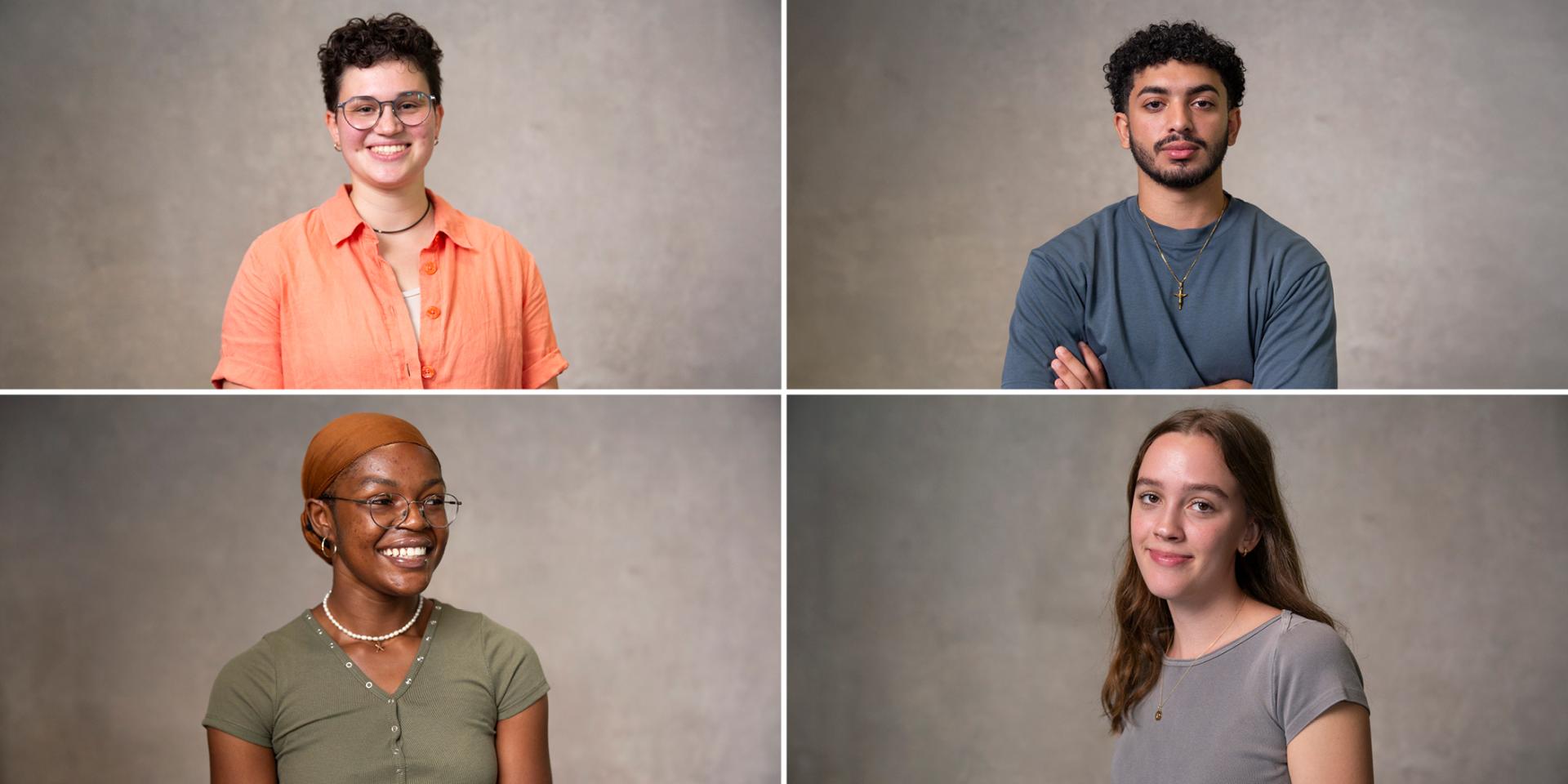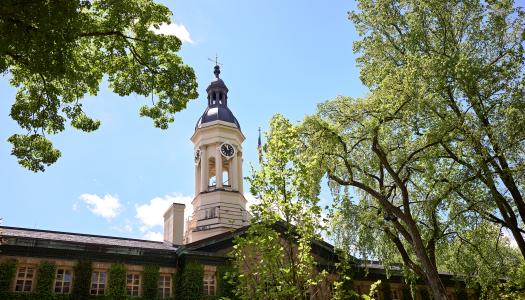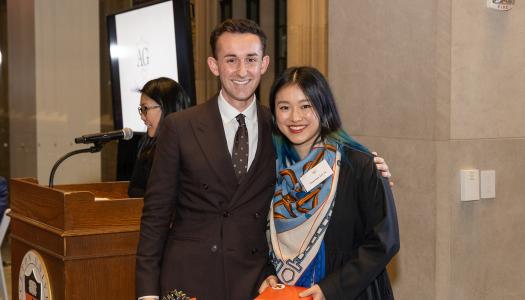Through the LENS initiative, Annual Giving is helping students experience life-changing service internships
Last summer, the Learning and Education through Service (LENS) initiative helped 363 Princeton students undertake internships to tackle issues of public health, youth empowerment, human rights and community service. Funded in part by Annual Giving, LENS ensures that every undergraduate student has an opportunity to participate in a paid service or social impact summer internship at organizations located across the country and world.
Now heading into its second year, the LENS initiative is creating even more opportunities for students by growing the number of internships available through LENS partner programs. This growth would not be possible without the support of Annual Giving, which funded the program’s launch in 2021 and is underwriting its expansion.
“Participating in LENS helped me realize the meaning of service,” said Mark Dawod ’24, whose pre-med studies include a major in molecular biology and a minor in global health policy. “By the end of my internship, I understood how best to approach my medical career in order to give back to my community.”
Dawod spent the summer before his senior year interning with Child Family Health International through the Office of International Programs’ International Internship Program, where he shadowed physicians as they made their rounds at a clinic and hospital in Cape Town, South Africa. “Social work is ingrained in their approach to family medicine,” he said, “so healing and caring for others is more than just the clinical part.”
As a result, Dawod is expanding his plans for medical school coursework beyond pathology and surgery to also include studying social determinants of health. “I’m so thankful for this experience,” he said. “It has clarified how I perceive medicine in the world.”
Jointly managed by the Center for Career Development and the John H. Pace Jr. ’39 Center for Civic Engagement, with participation from numerous internship programs across campus, LENS bolsters Princeton’s already strong network of internships in communities from Trenton, New Jersey, to South Africa to Ecuador. LENS ensures that students have even more opportunities to explore, grow and learn more about their own interests, no matter the career paths they choose to pursue.
For instance, Zhenia Khalabadzhakh ’26 interned with the Ukraine Permanent Mission to the United Nations (U.N.) last summer to see if a career as a diplomat was right for her. “I’ve always thought about diplomatic service and taken courses on international relations and public policy,” she said. “So it was amazing to see firsthand how to be a good diplomat and how to communicate the permanent mission’s work, especially given how it impacts Ukraine’s foreign aid.” A native of Kyiv, Khalabadzhakh has always loved languages and has set a goal of learning all six official United Nations languages by the time she turns 25: “I only have two more to go.”
With the ongoing war in Ukraine, Khalabadzhakh wanted to experience the inner workings of the U.N. to better understand how diplomacy could provide solutions to the conflict. “I worked with a diplomat who focused on women’s issues and human rights violations and their documentation,” she said. “We spent a lot of time raising awareness of the Ukrainian children who’ve been deported to Russia against their will.”
Khalabadzhakh’s internship developed out of a Princeton Ukrainian Society event with Sergiy Kyslytsya, Ukraine’s ambassador to the U.N. “I was just in the right place at the right time, since the internship opportunity came up during our group dinner after the event,” she said. Since internships at the Ukraine Permanent Mission to the U.N. are unpaid, Khalabadzhakh worked with Princeton’s Summer Social Impact Internship Fund (SSII), administered by the Center for Career Development, to secure LENS funding for it.
“Programs like LENS and SSII are incredibly important for students who are first-generation or low-income because they need to explore the career path they’re interested in but aren’t able to work without pay,” Khalabadzhakh said. Of the 363 Princeton students who benefited from LENS funding last summer, 19% are the first in their family to attend college and 20% come from low-income households.
“I would not have been able to go to Florida and work at the health department in Palm Beach County without the University’s support,” said Jenny Nwokeji ’25, a molecular biology major pursuing minors in African studies and engineering biology who participated in the SSII program. Born and raised in Harrisburg, Pennsylvania, Nwokeji really liked living in a place that was so different. “I feel like you should really know a community to serve a community,” she said.
With her time split between Palm Beach County’s health, epidemiology and environmental health departments, she experienced the different ways the county health department touched the community. “The whirlwind rotations allowed me to not just see the different divisions of public health, but what many of the people in each division did on a day-to-day basis,” Nwokeji said. “And I got to see with my own eyes the positive impact a well-run public health program can have on a large community.”
The internship helped her better understand what she wanted out of a potential career in government or public service. “As a molecular biology major, I came in interested in learning more about epidemiology and seeing what the microscopic interactions between pathogens and people look like because of the pandemic,” Nwokeji said. “Now I like the idea of treating patients directly, but also having an impact on the broader community.”
Spending the summer interning with Operation Smile International was equally eye-opening for Charlotte Kingston ’26, a neuroscience major working towards a certificate in Spanish who found her internship through the Pace Center for Civic Engagement’s Princeton Internships in Civic Service (PICS) program. “My experience this summer exposed me to so many different types of work environments,” Kingston said. “I did research and virtual data analytics and I was able to do clinical work and shadow surgeries.”
The internship helped her imagine the potential trajectory of her career and experience all the different service-related jobs. For instance, along with translating documents into Spanish, she worked on a research project analyzing the breastfeeding experiences of Operation Smile’s cleft lip and cleft palate patients. She also did data processing and analysis for a new system of medical records used by the organization’s patients all over the globe. She capped off the internship with an eight-day surgery mission to Ecuador to meet the nonprofit’s patients and help launch the new system.
While Kingston said she’s grateful for the experience of traveling to Ecuador, she returned home with a better understanding of what she’s capapable of. “It’s amazing that the LENS program empowers students about to embark on their career paths to figure out what they’re interested in while being exposed to the meaning of service,” Kingston said.
The LENS initiative helps extend the University’s mission of service by providing financial support so that every Princeton student can take advantage of internships that can make a difference.
“It’s great that Princeton goes beyond classes and scholarship to follow me into the real world, supporting me and having my back wherever I go,” said Khalabadzhakh. “At a time when there are wars, climate change and so many other problems in the world, sometimes doing things that don’t cost anything except your time and effort can be unbelievably impactful. You never know what kind of butterfly effect your actions kickstarted.”
Unrestricted gifts to Annual Giving go directly into the University’s operating budget for the benefit of Princeton’s students, faculty and programs. These flexible funds from undergraduate and graduate alumni, parents and friends allow the University to seize new opportunities, respond to unexpected challenges and support a pioneering financial aid program that makes a Princeton education possible for all admitted students. The 2023-24 Annual Giving campaign concludes June 30, 2024.



